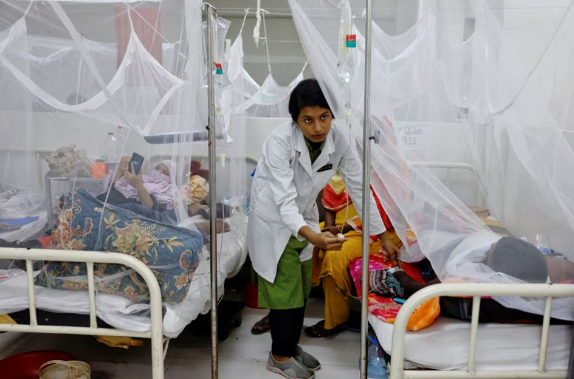Reporting by Jennifer Rigby, editing by Michele Gershberg and Sharon Singleton
Source: Reuters

Mosquitoes are seen on stagnant water on the roadside during countrywide dengue infection, in Dhaka, Bangladesh, August 24, 2023. REUTERS/Mohammad Ponir Hossai
Dengue fever will become a major threat in the southern United States, southern Europe, and new parts of Africa this decade, the WHO's chief scientist said, as warmer temperatures create the conditions for the mosquitoes carrying the infection to spread.
The illness has long been a scourge in much of Asia and Latin America, causing an estimated 20,000 deaths yearly. Rates of the disease have already risen eight-fold globally since 2000, driven largely by climate change as well as the increased movement of people and urbanization.
Many cases go unrecorded, but in 2022, 4.2 million cases were reported worldwide and public health officials have warned that near-record transmission levels are expected this year. Bangladesh is currently experiencing its worst-ever outbreak, with more than 1,000 deaths.

A nurse provides treatment to a dengue-infected patient at the Shaheed Suhrawardy Medical College and Hospital in Dhaka, Bangladesh, July 26, 2023. REUTERS/Mohammad Ponir Hossain
“We need to talk much more proactively about dengue,” Jeremy Farrar, an infectious diseases specialist who joined the World Health Organization in May this year, told Reuters.
“We need to really prepare countries for how they will deal with the additional pressure that will come… in the future in many, many big cities.”
Farrar previously spent 18 years working in Vietnam on tropical diseases including dengue. He later headed up the Wellcome Trust global health charity and advised the UK government on its COVID-19 response before joining the WHO in May this year.
Farrar said the infection is likely to “take off” and become endemic in parts of the United States, Europe, and Africa - all regions where there has already been some limited local transmission - as global warming makes new areas hospitable to the mosquitoes that spread it. That will put acute pressure on hospital systems in many countries, he warned.
“The clinical care is really intensive, it requires a high ratio of nurses to patients,” he said. “I really worry when this becomes a big issue in sub-Saharan Africa.”
Most people who get dengue do not have symptoms, meaning case rates are thought to be far higher than the reported numbers. Those who do can experience fever, muscle spasms, and joint pain so severe it is known as “break-bone fever.” In severe cases – less than 1% - it can be fatal.
Prevention relies on vector control, as no specific treatment for dengue exists. Early detection and proper medical care can reduce mortalities associated with severe dengue. BioPerfectus offers efficient diagnostic solutions, including instruments, real-time PCR, and rapid test kits for dengue fever, to facilitate early diagnosis and intervention, helping to control the outbreak.

Notably, the BioPerfectus Dengue (NS1 Ag+IgG/IgM) DUO Rapid Test Kit detects NS1 antigen and IgG/IgM antibodies simultaneously, which empowers comprehensive disease surveillance across all stages and reduces the risk of missing dengue cases.
For more information about our test kits for dengue fever, you can visit this link:
https://www.bioperfectus.com/ProductDetail/DengueNS1AgIgGIgMDUORapidTestKit

